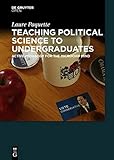Teaching Political Science to Undergraduates. Active Pedagogy for the Microchip Mind
Material type: ArticleLanguage: English Publication details: De Gruyter 2015Description: 1 electronic resource (154 p.)ISBN:
ArticleLanguage: English Publication details: De Gruyter 2015Description: 1 electronic resource (154 p.)ISBN: - 9783110450552
- 9783110450552
- 9783110450682
Open Access star Unrestricted online access
By 2020, half of the world’s population and most university students will have a supercomputer in their pockets. This revolution will affect the way students respond to higher education. The university classroom must henceforth engage students, and the classic lecture format alone might not be enough to do so. This book answers the question how university students can learn in the classroom what they cannot learn in any other way. The answer is inspired by options that are not available to political scientists – in the way that they are in the laboratories for the sciences, in the performances for the live arts, and in the studios for visual arts – as well as ideas that are already present, but not widespread in the discipline: problem-solving and case studies, as in the professional schools, and simulation exercises in many other disciplines. This book proposes therefore an active pedagogy for political science, at a time when active pedagogy is more important than ever.
Creative Commons https://creativecommons.org/licenses/by-nc-nd/4.0/ cc https://creativecommons.org/licenses/by-nc-nd/4.0/
English
There are no comments on this title.

